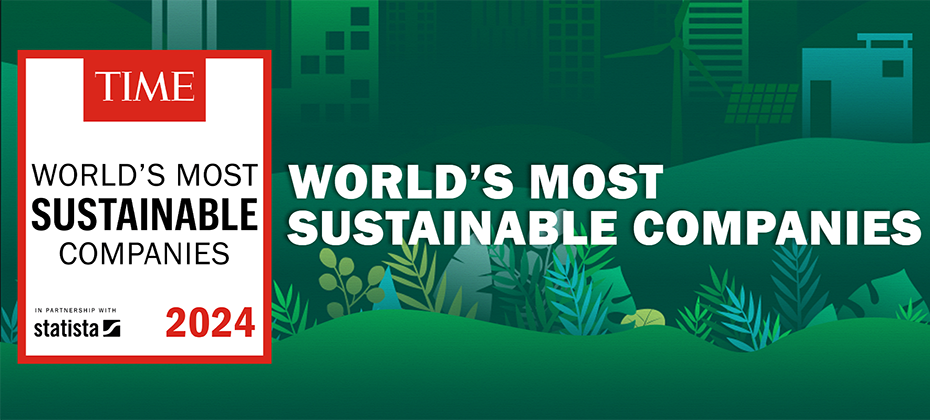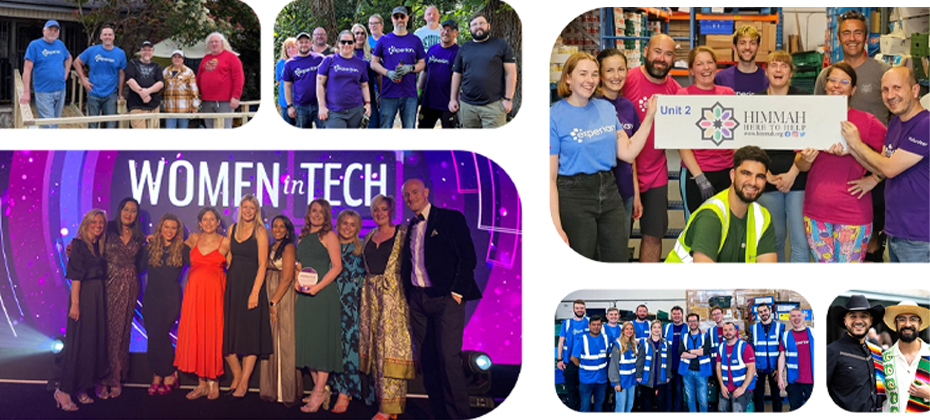
At Experian, we often say our people are our biggest superpower – and today, I’m thrilled to share that this belief has been recognised once again. Experian has been named one of the 2025 World’s Best Workplaces™ by Fortune and Great Place to Work® for the second year in a row.
This achievement reflects the culture we’ve built together – one that’s welcoming, inclusive, and rooted belonging. It’s a celebration of every colleague who brings their whole self to work, who lifts others up, and who powers opportunities for our clients, consumers, and communities.

We’ve made it our mission to create a workplace where everyone feels included, respected, and empowered. That’s why we’re proud to have earned top scores on the Corporate Equality Index and the Disability Equality Index, and to be recognised with the Outie Award for Workplace Excellence and Belonging.
These recognitions matter. But what matters most is how our people experience life at Experian. Whether it’s collaborating, innovating, or growing through world-class development of products, services and contributing to our communities, our culture is designed to help everyone thrive.
We’ve also made bold commitments to career development. Initiatives like Global Careers Week, the AI-driven performance coach Nadia, and the NextGen Forum – a global leadership development programme for emerging talent from across our regions – give our people the resources to take charge of their growth and build a “One Experian” mindset.
Being named one of the World’s Best Workplaces is a moment to celebrate but also a reminder to keep aiming higher. The world of work is evolving fast, and so are we. From embracing AI to enhancing our digital workplace experience, we’ll continue to push forward and listen to our people every step of the way.
Questions we will discuss:
- What does “retirement readiness” mean to you, and how can someone tell when they are financially ready to retire?
- Is there a magic number for retirement savings, and what factors should someone consider when setting a retirement goal?
- How can someone estimate their retirement expenses realistically?
- What are some common myths or misconceptions about how much money you need to retire?
- How should Gen Z, Millennials, and Gen Xers each approach retirement planning differently based on their stage of life?
- What are the biggest obstacles people face when trying to save for retirement, and how can they overcome them?
- How can you balance saving for retirement with paying off debt or supporting family today?
- What tools, calculators, or strategies can help people figure out if they’re on track for retirement?
- How can people prepare for unexpected costs or life changes that could impact their retirement plans?
- What’s one piece of advice you’d give someone just starting—or restarting—their retirement savings journey?
| Columns 1 | Column 2 | Column 3 | Column 4 |
|---|---|---|---|
| Row 1 Col 1 | |||
| Row 2 Col 1 | |||
| Row 3 Col 1 | |||
| Footer 1 | Footer 2 | Footer 3 | Footer 4 |

Credit Chat
Stretching your Dollars: Practical Tips to Cut Costs and Save More
February 5, 2025 3-4 PM ET
- What does “retirement readiness” mean to you, and how can someone tell when they are financially ready to retire?
- Is there a magic number for retirement savings, and what factors should someone consider when setting a retirement goal?
- How can someone estimate their retirement expenses realistically?

Greater transparency in buy now, pay later activity is key to helping consumers build their credit histories and supporting responsible lending. We have members of the military right now right out of high school and there’s not a lot of experience managing their own money. They’re quickly thrust into a place where they don’t have a support system to do that. We have members of the military right now right out of high school and there’s not a lot of experience managing their own money. They’re quickly thrust into a place where they don’t have a support system to do that. We have members of the military right now right out of high school and there’s not a lot of experience managing their own money. They’re quickly thrust into a place where they don’t have a support system to do that. We have members of the military right now right out of high school and there’s not a lot of experience managing their own money. They’re quickly thrust into a place where they don’t have a support system to do that. We have members of the military right now right out of high school and there’s not a lot of experience managing their own money. They’re quickly thrust into a place where they don’t have a support system to do that.
Experian North AmericaScott Brown, Group President, Financial Services

We are thrilled to announce that Experian has been named to TIME Magazine’s inaugural "World’s Most Sustainable Companies 2024" list, a testament to our ongoing commitment to environmental stewardship and sustainability leadership. This award is granted on a comprehensive research study conducted by Statista to identify the most sustainable companies across the globe, recognizing companies that are committed to preserving the planet and ensuring future generations inherit a world rich in natural beauty and resources. Experian achieved significant milestones in our sustainability journey in just the past year alone: Our renewable energy usage increased from 62% to an impressive 75%, marking a substantial step towards our goal of maximizing sustainable energy sources. We reduced our overall energy consumption by 19%, contributing to a remarkable 75% reduction, putting us well ahead of schedule in achieving our ambitious goal of a 50% reduction in direct emissions by 2030. As our business has grown, Experian has managed to decrease the carbon intensity of our direct emissions by an impressive 35%. This achievement underscores our dedication to operational efficiency and sustainable practices across our global operations. Looking beyond our direct impact, Experian has committed to working with suppliers that also adopt science-based targets by 2029, demonstrating our influence in driving sustainability throughout our supply chain. At Experian, sustainability is not just a corporate responsibility but a core part of our business strategy. We are dedicated to advancing environmental sustainability, driving positive change in our industry, and contributing to a healthier planet for future generations. As we continue on our journey to Net Zero, we remain committed to setting new benchmarks and leading by example in corporate sustainability. For more information on our sustainability initiatives and progress, click here.

Making a real difference in the world starts with embracing Diversity, Equity, and Inclusion (DEI) and accelerating social impact. It's not just the right thing to do, but it's also key to our mission of creating a better tomorrow, together. DEI isn't just a buzzword for us; it's at the heart of everything we do. Whether it's in our sustainability strategy or our day-to-day operations, we're committed to driving positive social impact and closing the financial wealth gap in underserved communities. It starts with our people. We’re proud to share their dedication and work in this year’s Experian Power of YOU Report 2024: Driving social impact and diversity, equity and inclusion in English, Portuguese and Spanish. Within these pages, you’ll see how we foster belonging with our teammates, and champion DEI beyond the walls of Experian. From developing products like Experian Smart Money to expanding Experian Boost in the United Kingdom, and launching Advance XScore in Peru, we're dedicated to making a difference in the world around us. To that end, you’ll see we’ve also included, for the first time, our new Positive Social Impact Framework, which will reinforce and help our clients, consumers and employees further understand how we are making a difference in our communities. At Experian, we strive to build a brighter, more inclusive future – for our employees, our clients, and our communities. Together, we can make a real difference.

Caps and gowns. Pomp and circumstance. Loans and debt. As the class of 2024 celebrate their college graduations, more than 43 million of them leave school with a total national debt of more than $1.6 trillion. Some are on better financial footing than others – with no debts as they start their careers – because of early financial and credit education. These learnings fueled ideas for students from Historically Black Colleges and Universities (HBCUs) who competed in this year’s #IYKYK Pitch Competition (If You Know You Know), sponsored by HomeFree-USA and Experian. The challenge: to create solutions that help their peers become debt-free within five years of graduation. Here, finalists share some advice for graduates on how they can start their post-collegiate lives on solid financial footing: OLUWATOSIN OYEKEYE, Alabama State University You're not too young. I feel like most people think it's until you're married or you have kids before you should take your financial life seriously. From your first couple of first paychecks, look into where you can invest. If you don't want to live from paycheck to paycheck, look for ways to grow your money. Take your credit seriously. If you want to own a home, you want to buy a car, these things are important. It's not too early, it’s also not too late to start taking these things seriously. JAZMIN FELIZ ORELLANA, Bowie State University You don't have to start off with a credit card with a $10,000 limit. You can easily start off with a secured credit card. And that's actually one of my biggest pieces of advice. Get a credit card, be mindful with it, don't spend, don't max it out, but definitely just practice and start using it to see if you're actually able to maintain your credit. That's a piece of advice that definitely has worked with me, especially with building up my own credit, which I hope to get soon to 800. MARCUS HARRIS, North Carolina A&T University Always go out and explore opportunities that could first boost your credit and put you in a more financial-free state. For example, with Experian, they have an Experian Boost program that when you're in school, if you have rent, you rent an apartment, you could apply that. Or even the Netflix subscription, you can apply that to the Experian Boost program and therefore you can help build your credit over the time. TAYLOR PAYTON, Bowie State University To college students who are about to graduate, once they get that job offer with a lot of zeros behind it, be mindful of lifestyle influences. Just because you're making a certain amount of money does not mean you have to spend all of it. Be mindful not to keep up with the Joneses. CHIOMA KALU, Alabama State University There's something my sister used to say. She used to say, "Pay now, play later. Or if you play now, you pay later." I feel like if they focus during their youth when they can really do these things and really go out there, do the jobs, focus on paying off everything, getting that financial literacy, getting that financial freedom, and then at age 30 you're already set up for life. That makes more sense than just going through life, just ballin’, and then at the end of the day, if you have to pay when you're like 60? You're still paying student loans? Come on, now. CALVIN CHARLES III, Bowie State University Do not get caught up in social media. Just because you want to live in the city doesn't mean that that's what you have to do. And there's nothing wrong with roommates. They can allow you to reach your actual goals. Every meal does not have to be eaten out. Social media creates a lifestyle that you wish to live, and living in that moment is great, but you have to think about your future and building that wealth for yourself directly afterwards. All of these students were part of the Center for Financial Advancement Credit Academy. To learn more about this program that supports HBCU students, click here.
2024 Best Place to Work for Disability Inclusion


